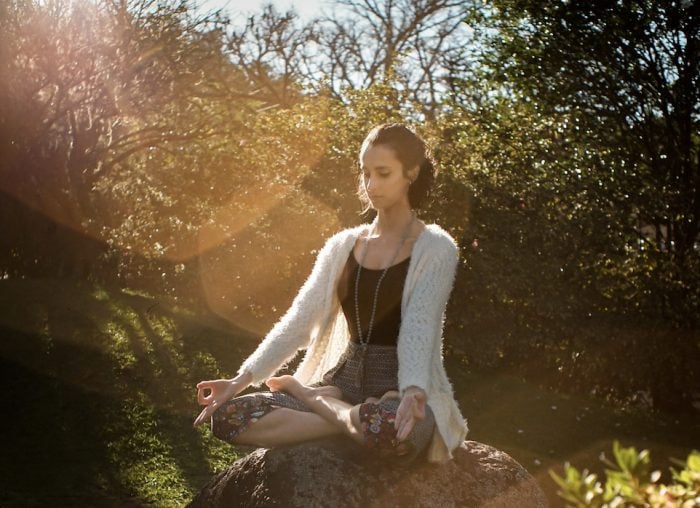The call to meditate has never been stronger, with many people suffering from anxiety and depression simply because many are no longer connected to their infinite being.
Many people live in fear, not realising the power they have within them that is connected to the infinite intelligence of the universe. Fear is the number one blockage in life.
Meditation does more than just help you relax. For those who have experienced the physical and subtle effects of meditation, it has been life-changing.
So what is meditation?
Today, we see various definitions and types of meditation, depending on which school we are coming from. The common misconception is that meditation is only about going into blankness. However, this is not true. Meditation is about going into a heightened state of consciousness. It takes an immense amount of focus and concentration to achieve this state. It is not a state of blankness or boredom that will put you to sleep. So if we are getting sleepy or bored while meditating, we are probably doing it the wrong way. It could be a lack of ability to focus.
There is nothing religious about meditation. It does not matter what our belief system is, whether we believe in god, divine light, universal energy, or life-force energy—it is not about religion. It is all about merging with the infinite power or the infinite intelligence, which is the source of all creation and resides within us.
What is important is to know that we are more than our physical body. We are energy first before matter. Through meditation, we journey inward to merge with that energy, our inner self, and our infinite self, which takes us to our superconscious state.
Meditation is more than mindfulness. In fact, mindfulness is only part of meditation. Mindfulness is about being aware of our thoughts and the emotions that go with them and letting them go. It’s about focusing on our breath and being present in the present moment, which is the first phase of meditation. Mindfulness can help us relax and help with personal development. Meditation is much deeper than that.
Why meditate?
We are able to achieve ecstasy when we merge with pure love, light, peace, and joy, which is our true essence. We merge with universal energy and bring in this energy to raise our energy and activate higher light codes. It helps with clearing away unwanted imprints in the energetic DNA and activates higher DNA strands leading to a higher state of consciousness.
Our DNA is basically the blueprint of our existence on a physical as well as energetic level. Our DNA strands hold onto memories from our past, past lives, and ancestral energy. These include the positive as well as negative memories and imprints. It is also the doorway to our higher conscious states. This is what Kundalini energy is all about. Raising our consciousness and ascending.
As we heal our past and receive more light, we activate our higher light codes that are connected to the dormant cells in our brain, which allows us to embody more of our divine self. We start to ascend, which is our soul’s mission. As we do this, we receive more clarity, and life becomes easier. Our innate gifts, the power to manifest and heal ourselves, are enhanced. We start to see and experience life differently.
This happens naturally when we meditate correctly. When this happens, we realign ourselves with our higher self. It’s like plugging into the universal energy where we start to receive higher guidance. Life becomes easier because we start to operate through our higher conscious state.
As the popularity of mindfulness and meditation grows, so has the scientific proof of its benefits. Brain-imaging techniques have revealed that meditation profoundly changes the way different regions of the brain communicate with each other and, therefore, how we think. It has been scientifically proven to reprogram your brain.
The simple act of closing our eyes, shifting our focus inward, and removing clutter from the mind is able to light up dormant cells of our brain that are not usually activated when we are in a cluttered state.
Scientifically, it has been proven to enhance the brain’s frontal lobe—especially the prefrontal cortex—which is responsible for human behaviour. It also interrupts the primitive areas of the brain that initiate and coordinate the unconscious primitive stress reactions throughout the brain and body. This reduces stress reaction and stimulates the immune system to function more effectively.
Today it is also visible that meditation creates a link between the infinite cosmic energy and the physical body. It is clear that we are able to manifest physical changes in our lives by shifting our thoughts and consciousness.
When we meditate, we also become a conduit for higher light to flow through us and into the world, helping to raise the consciousness of earth and humanity and to radiate light to others in need. Having this consciousness within us during meditation is powerful and helps with more than just self-enlightenment. So if you are passionate about bringing change to the world—then meditate to bring light into the world.
How do we meditate?
One thing to keep in mind is to always be seated straight during meditation. This may not be necessary if we are practicing Yoga Nidra, listening to guided meditations, or hypnotherapy recordings for relaxation or healing. In those cases, we prefer to lie down or relax on a couch. Sitting up helps us to focus better, which is essential in meditation—that is the difference between meditation and relaxation.
When you sit, sit comfortably either on the floor or in a chair. It enables light or energy to flow through the energetic spine and for the Kundalini energy, which is the dormant energy coiled at the base of the spine, to flow upward naturally. If we are not used to sitting in Siddhasana—which is the lotus position—on the floor, then it would be better to sit on a chair.
The point is to be comfortable throughout the meditation and to keep the spine erect at all times. Sit with your back away from the chair and do not slouch. We can use support if necessary.
Sit straight, chin parallel to the floor, shoulders slightly to the back, and palms open on your thigh near your abdomen. If you place your palms near your knee, you will not be able to keep your shoulders back, which will cause discomfort. Many beginners complain about pain in their back or shoulders when meditating. If that is the case, we should use support where necessary, using towels or cushions to support our arms or hips.
The other important aspect is breathing in properly and consciously. Proper breathing helps remove pain and discomfort around the shoulders and neck area— I am talking about diaphragmatic breathing.
In fact, diaphragmatic breathing is the way we should be breathing at all times. We breathe the air into our abdomen and allow our tummy to swell. We allow our diaphragm—the dome-shaped muscle between your stomach and lungs—to expand. We breathe in through our nose and feel the air filling us up from our abdomen, moving up into our lungs without expanding our chest or shoulders. Then we will exhale through our nose and mouth. This breathing alone can help us relax naturally. If done consciously throughout the day, it can help with anxiety, stress, and other health problems.
Another point to remember is to keep our eyes shut and our gaze at the point between our eyebrows. This is our third eye and the doorway to our soul and ignition to our light body. By focusing on this point, we are able to immediately shift our focus to our inner-self and activate that inner-power. By specifically focusing on this point between the eyebrows, the energy is directed directly to this part of the brain—our prefrontal cortex and our spiritual eye—helping us spiritually, physically, mentally, and emotionally. It also activates our light body.
The next point to take note of is the place we meditate in. Find a clean, quiet place without any distractions. If possible, create a sacred space or an altar with candles or anything else that creates a sacred, peaceful ambience. Finally, before we start, it would be good to say a prayer or ask for higher guidance—or just say a positive affirmation.
These are some basic guidelines to help you with your meditation practice. Attending meditation courses can also help us to deepen our learning process as we will be guided through step-by-step.
Always remember that you are an infinite being manifested into a physical form. Within you lies infinite wisdom and power to create the life that you want. Do remember to share your meditation experiences and positivity with family and friends—maybe even help them get into their own practice. Meditation can help us create a positive shift in the world.
~









Read 13 comments and reply